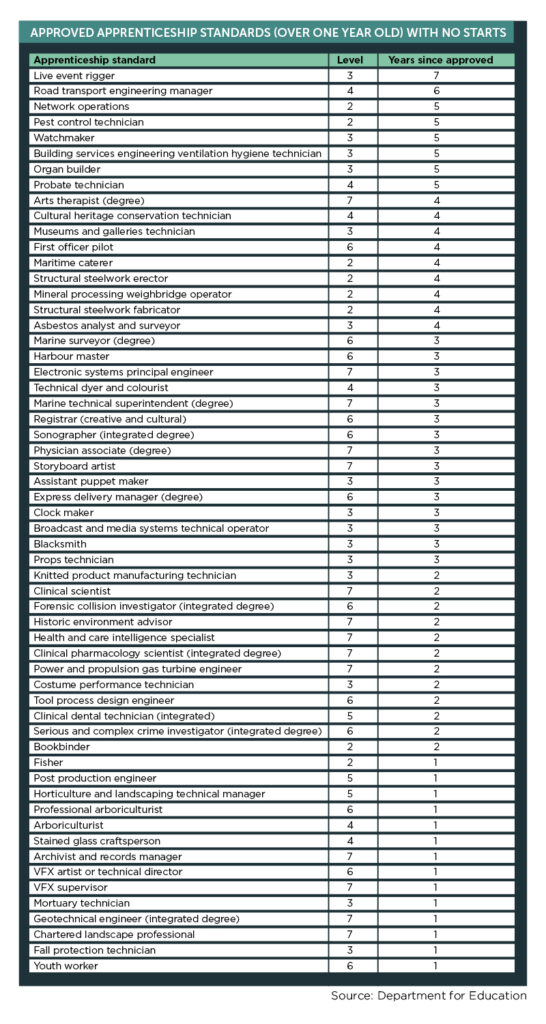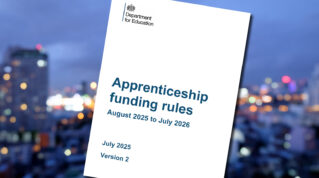Nearly one in ten established apprenticeship standards have failed to enrol a single apprentice, FE Week can reveal.
FE Week analysed starts data for the 668 currently “available for delivery” apprenticeship standards and found that 58, which have been approved for over a year, have yet to recruit (full table below).
Despite passing the Institute for Apprenticeships and Technical Education’s (IfATE) various layers for approval – including tests for employer demand – leading employers have laid the blame on a mix of complex bureaucracy and risk-averse training providers.
Industry insiders also report that employers in some sectors are turning their backs on apprenticeships and reverting to more traditional courses because of the requirements placed on them by the current system.
Among the list of zero-start standards are the level 6 in youth work, the level 2 in network operations and niche occupations such as the level 3 assistant puppet maker, level 3 knitted product manufacturing technician and the forensic collision investigator degree apprenticeship.
Eight standards without any starts have been “approved for delivery” for over five years. The level 3 live event rigger apprenticeship, for example, was approved in December 2015 and apprenticeships for organ builders, pest control technicians and watchmakers have supposedly been available for five years but haven’t enrolled a single recruit.
A spokesperson from IfATE told FE Week: “It’s important to first give an apprenticeship time to bed in. However, ‘no or low starts’ is one of the criteria we use to prioritise the review of a particular apprenticeship and its delivery and, if the data indicates a delivery problem, we will aim to address it.
“If this is not possible, we will ultimately withdraw the apprenticeship. Such action requires careful consideration and resource, which we balance against the urgency of reviewing and revising apprenticeships with starts which may be impacting on learners, particularly where the withdrawal rate is high.”
Our analysis shows that the institute has retired ten previously approved apprenticeships that didn’t recruit.
Questions have now been raised about whether the institute has given too much power to employers and whether it keeps a close enough watch on the demand for apprenticeships in the economy.
How to get approved
To get an apprenticeship approved, employer groups, still referred to as trailblazers, follow a process overseen by IfATE. This involves providing evidence of the demand for specific skills training in their industry.
There’s even an expectation, set out in IfATE guidance, that employers involved in the development of an apprenticeship will themselves take on apprentices once it is approved, but this is clearly not enforced.
Proposals from trailblazer employers then go through the relevant IfATE route panel, made up of industry experts who “make sure the apprenticeships are high-quality and meet the needs of employers”.
The institute said it tests whether an occupation proposed for an apprenticeship is in demand by employers by “comparing the occupational profile with job advertisements and recruitment materials”, and “reviewing evidence that the occupation is in demand from a range of employers, using similar occupation/job titles and descriptions”.
The final hurdle is the IfATE approvals and funding committee, but the apprenticeship is only fully signed-off once both the standard and end-point assessment plan has been approved, the secretary of state for education has agreed to a funding band, and an end-point assessment organisation has “committed” to delivering the EPA.
It’s not me, it’s you
Several employers told FE Week there are live discussions in their industries on whether apprenticeships are now the right way to train the next generation of skilled workers in their industries.
The British Engineering Services Association (BESA), a trade body, got three apprenticeship standards over the line for its industry. In fact, it was one of the first.
Its level 2 building services engineering ductwork installer and level 3 building services engineering ductwork craftsperson standards have recruited fewer than 50 apprentices since they were approved in 2017.
Meanwhile, its building services engineering ventilation hygiene technician, also approved in 2017, “should never have been an apprenticeship in the first place”, according to Helen Yeulet, BESA’s director of training and skills, and “wouldn’t be approved if it was submitted today. It’s not got the content.”
All three of those standards are now going through IfATE’s withdrawal process.
Yeulet told FE Week how, back in 2017, employers were encouraged by the promise of apprenticeships, “employers like a freebie” but hadn’t fully clocked the level of commitment needed on their part.
The industry is reviewing how it wants to train its workers. “We are now delivering short courses with encouraging uptake … but they’re not interested in apprenticeships.”
Historic England, which saw through standards for historic environment advisers and cultural heritage conservation technicians, neither of which have recorded any starts to date, told FE Week it has commissioned research to better understand the needs of employers in its sector.
The findings from employers cite a lack of resources in the sector to support apprenticeships, a lack of available training providers and a “lack of an apprenticeship culture” within the sector.
And a representative from the fashion industry, which did not want to be named, told FE Week that it was working with employers who “prefer the stability and certainty of traditional diploma courses, even though they’ve paid into the levy”.
The institute has defended its processes but admitted that the availability of training providers and end-point assessment organisations could prevent an approved apprenticeship from taking off.
An IfATE spokesperson told FE Week: “The development of any apprenticeship is an employer-led process and, as part of this, we seek assurances of likely demand from the relevant employer group before agreeing to its development. This is then sense-checked as part of our approvals process, including by the relevant sectoral route panel.
“Issues can arise that cause apprenticeships to have no (or lower than expected) take-up. These issues range from the content of the apprenticeship itself to delivery issues such as provider or EPAO availability, to wider-ranging issues such as the impact of Covid and the economic climate.”
‘I’m a blacksmith, not a publicist’
Micro and heritage industries have also struggled to make the system work for them. Among the list of apprenticeships that recorded no starts are standards for blacksmiths, bookbinders, watchmakers, organ builders, stained glass craftspeople and assistant puppet makers.
David Poole, education officer at the Worshipful Company of Clockmakers, has been involved in the watchmaking apprenticeship employers’ group since it started working on getting the standard approved through 2016/17 and is still working to make it a success.
For Poole, finding and retaining a training provider that can deliver the specialist niche training needed for small numbers of apprenticeships has been difficult. While there have been a handful of starts on the apprenticeship – though these don’t appear in DfE figures – job losses during the pandemic made continuing the course unviable and the programme closed.
“The issue of delivering a niche apprenticeship where there might be a dozen apprentices a year is the government bureaucracy that’s involved and identifying a lead provider that you can work with,” Poole said. “It’s always too difficult for them to proceed.”
Poole told FE Week that IfATE is “looking into this problem” and he hopes “there’ll be a greater focus on the problems of delivering tiny apprenticeships”.
“It’s very sad,” Poole added. “There should be an answer for very small niche areas of employment.”
Finding a specialist training provider that can take the financial risk of small cohorts is also an issue facing Adrian Legge, who leads the employer group for the four-year level 3 blacksmith apprenticeship. The standard was approved in February 2020 but a combination of Brexit and Covid has “knocked the confidence of employers to invest in training”, he said.
“We looked at nominating a single off-the-job training centre, but they need a certain amount of trainees to make it viable for them. It’s a case of trying to persuade a training centre to run something where the returns are likely to be quite low and the risks are quite high. There’s this level of uncertainty involved,” Legge said.
Legge, who is self-employed and works on the apprenticeship voluntarily, told FE Week he thinks he’s personally invested “thousands of pounds” representing the industry and trying to get the apprenticeship off the ground.
On the employer group he leads, Legge said: “We’ve got several directions to give this apprenticeship a push, but we’re all pretty much entirely self-employed volunteers. We could do with a more concrete support package around advertising. You know, I’m a blacksmith, I’m not a publicist.”
Universities, as well as training providers, can also take some convincing to take on the risk of delivering new or niche apprenticeships.
Poole described the “threat of an invasion from Ofsted” as turning off the universities he has tried to engage.
Stewart Edmondson, from the UK Electronic Skills Foundation, led the development of the level 7 electronic systems principal engineer. He has found that universities are reluctant to engage without evidence of demand from employers, “but there isn’t demand because employers won’t commit to something that doesn’t exist”, Edmondson told FE Week.
Edmondson, whose standard was approved in 2019, also takes aim at the Institute’s “very difficult” processes and lack of ongoing support for the standards it approves.
“They [IfATE] say there’s been no starts and, unless something happens, they’re going to withdraw it. But they don’t help. The level 7 was supposed to be available for employers to use as part of their development programme for graduate engineers.”
A spokesperson for Health Education England told FE Week it’s three no-start degree apprenticeships – physician associate, clinical dental technician and arts therapist – have not recruited due to “complex processes around course validation, procurement, approvals and other matters”.
Setting standards
For Tom Bewick, chief executive at the Federation of Awarding Bodies, this all points to the need for IfATE to be more demanding on what it expects from employers.
“The Institute appears to have developed these standards in quite a rigid and highly technocratic way, without first assessing their real employer demand,” Bewick said. “In Germany and Switzerland, firms via industry bodies have to agree to take on a minimum number of apprentices before the standards setting bodies will even begin a developmental process.”
The Association of Employment and Learning Providers (AELP), which represents training providers, is also in favour of consolidating standards.
Jane Hickie, chief executive, said: “AELP is fully supportive of an employer-led approach to apprenticeships. However, the proliferation of standards has had an impact on the ability for timely reviews of content and funding to take place.
“Alongside consolidating the existing portfolio into a ‘core and pathway’ type approach to manage demand for niche provision, a more sensible approach would be to limit new standards unless there is evidence of proper demand and supply. This would allow limited resources to be used to focus instead on completing reviews of existing standards more quickly.”
A Department for Education spokesperson said: “It is for employers to tell us which apprenticeships they need for their businesses. IfATE routinely reviews standards with low numbers of starts and will take action where necessary, reflecting current and future demand.”


















Live event rigger had definitely had starts and completions as they were assessed by Progress Minded. However it was just a handful. We knew when we took on the standard that it wouldn’t be commercially viable but had strategic reasons for doing it
The DFE was warned about this years ago when the Trailblazers were being set up. They didn’t care. Low numbers=not worth doing in their eyes, while going at speed to defund NVQs and remove them from standards. Niche NVQs assessed on the job always had a place for niche job roles.